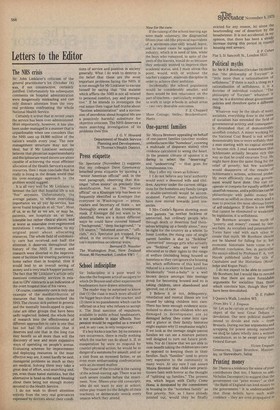School indiscipline
Sir: Indiscipline is a poor word to describe the frequent acts of savagery to which Dr Boyson and other experienced headmasters have drawn attention.
The reader may be surprised to know that (1) the class is much more afraid of the bigger boys than of the teacher, and (2) there is no punishment which can be inflicted on a boy who refuses to accept it. The final sanction of expulsion, available to public school headmasters, is not available in state salmis. Suspension would be regarded as a reward and, in any case, is only temporary.
If a boy kicks a teacher, by no means a rare occurrence, there is really nothing which the teacher can do about it. If, in exasperation he were to respond by counter-physical action, he would be in danger of a summons for assault, and/or a visit from an incensed father, or an even more embarrassing confrontation with an incensed mother.
The cause of the trouble is the raising of the school-leaving age. There was no such severe trouble before the enactment. Now, fifteen-year-old conscripts, who do not want to stay at school, either play truant (to the delight of their teachers), or deliberately wreck every session which they attend. Now for the cure: If the raising of the school-leaving age were made voluntary, the disgruntled fifteen-year-old (the physical equivalent of a seventeen-year-old) would leave, and in many cases be apprenticed to industry, which is in need of him, while the boys who remained, in spite of the jeers of the leavers, would do so because they seriously wanted to improve their academic status, and, I must stress this point, would, with or without the teacher's support, maintain discipline in order to achieve their ambition.
Incidentally, the school population would be considerably smaller, and there would be less reluctance on the part of teachers particularly women to work in large schools in urban areas two very desirable outcomes.
F. E. Chappell Moor Cottage, Setley, Brockenhurst Hants
































 Previous page
Previous page